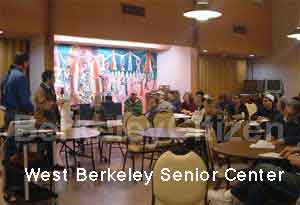Report Claims Pacific Steel Emitted Toxic Chemicals
SAMEEA KAMAL, Daliy Califorian, February 1, 2008
 Report Claims Pacific Steel Emitted Toxic Chemicals
Report Claims Pacific Steel Emitted Toxic Chemicals
Berkeley, CA
A group of West Berkeley volunteers released results Tuesday of an air quality test which showed hazardous emissions from Pacific Steel Casting, following a similar report by the company a year ago with opposite results.
The foundry is contesting the results of the volunteers, citing research flaws and findings from their own report, which concluded the factory emitted chemicals at or below legal limits.
The residents' report, which conducted air sampling for small particles in 23 locations within a half-mile radius of the steel foundry, was overseen by the San Francisco-based nonprofit Global Community Monitor and completed by the West Berkeley Community Monitoring Project.
"Two-thirds of the locations that we sampled at found toxic, heavy metals that exceeded one or more of the health thresholds that we were comparing them to and more than half of the samples exceeded a health-based screening level," said Denny Larson, executive director of Global Community Monitor.
For seven months, the volunteers collected 64 samples to test for high levels of manganese and nickel, both of which can cause serious health issues, Larson said.
"We employed very sound science in the testing protocols ... and worked closely with the air district staff on site selection and the whole method of collecting samples," he said.
The foundry has contested these results, citing that the Bay Area Air Quality Management District, who funded the testing, has not yet approved the results.
Officials from the district said they are working to validate the data.
"The air district considers (the results) to be preliminary," said district spokesperson Karen Schkolnick. "We do have some concerns about the methodology, their calculations of concentration and their use of health-based standards and we've communicated those concerns and questions back to Global Community Monitoring and we're working with them on the data."
According to Larson, project members checked the government's official meteorological wind data daily to conduct the tests.
But the sampling was done by biased individuals that lacked scientific training, said foundry spokesperson Elisabeth Jewel. Also, she said results are based on the World Health Organization standards, which are not applicable to United States' facilities.
"Any results that the folks come up with cannot be tied exclusively to Pacific Steel Casting," Jewel said. "They are measuring a cocktail of emissions from numerous sources, they moved their monitor around constantly, and the wind direction changes constantly. It's impossible to say what the source is."
But Larson said his group conducted a controlled sample, with monitors to test how much pollution was coming from other potential sources.
The foundry agreed to pay a $150,000 fine and make improvements to their facility when they settled a lawsuit with the air district in 2007.
"Over the last couple of years, Pacific Steel Casting has spent millions upgrading equipment and installing technology and the result of that is odor complaints have plummeted," Jewel said. "What we're doing is working."
In response to public concerns, the foundry also agreed to complete the emissions study.
Residents who participated in the second study are currently compiling a report to present to the city that they hope will result in a meeting to address zoning policies in the area, Larson said.
"Now that we know people have been exposed, its important for the city to recognize its obligation to study the problem," he said. "The city has permitted this company and permitted people to live there and now its time to face the music and see their consequences."
Photo Courtesy Ruth Breech